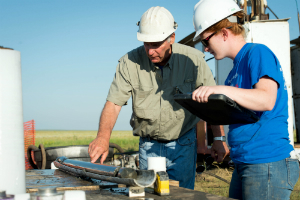The first of two shale core drillings this summer has begun in Fort Pierre, S.D., and is set to be completed this week.

|
| Students prepare shale core samples for advanced laboratory testing. Source: South Dakota School of Mines & Technology |
Researchers will determine if it will be possible to build the nation’s first underground research laboratory there using geo-mechanical analysis.
The S.D. School of Mines & Technology will examine thousands of pounds of the shale core samples with its partner RESPEC, an engineering consulting company based in Rapid City, S.D.
Shale cores have been removed from the ground at 5-foot intervals to an expected total depth of 600 feet. The shale drilling could offer insights into enhanced energy production, carbon dioxide sequestration, underground hydrocarbon storage and waste disposal in the future.
Faculty and student researchers have been on site preparing samples for analysis. Their findings will be useful for industries like drilling, where understanding the characteristics of shale and other fine-grained geological units is important.
The School of Mines is close to the Bakken, Mowry and Niobrara shale plays.
The shale program is part of the university’s Energy Resources Initiative, which includes a new minor in petroleum systems and expanded research. It was announced in April after South Dakota approved $464,000 for the research. The university and RESPEC have been partners since 2012, when the Department of Energy and Sandia National Laboratory funded $150,000 for an initial investigation.
The drilling is being conducted by a private company at the direction of William Roggenthen, Ph.D., research scientist, and Lance Roberts, Ph.D., head of the Department of Mining Engineering & Management.
A shale database could bring to light more unknowns and prompt further study by industry and government collaborators.
The South Dakota School of Mines & Technology is bordered on three sides by the Williston Basin (Bakken, N.D.) to the north, the Powder River Basin to the northwest and the Denver Basin directly south. The university offers bachelor’s, master’s and doctoral degrees in science and engineering. For more information, visit www.sdsmt.edu.




Report Abusive Comment